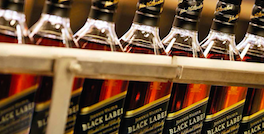Diageo, Scotland’s largest whisky producer, said on Tuesday its reported operating profit fell 47.1% to £2.1 billion in the year to June 30 fell as sales of Scotch for the drinks giant fell 17%.
The world’s largest spirits maker said sales of its Johnnie Walker product declined 22%.
Exceptional operating items included impairment charges of £1.3 billion.
Reported net sales were down 8.7% to £11.8 billion.
Nonetheless, Diageo said its final recommended dividend of 42.47p per share is the same as the final dividend for fiscal 2019.
This brings the full year dividend for fiscal 2020 to 69.88p per share, an increase of 2%.
“Scotch represents 23% of Diageo’s net sales and declined by 17%,” said Diego, which has dozens of blended and malt Scotch whisky brands including Johnnie Walker, Bell’s, J&B, Vat 69, White Horse, Cragganmore, Dalwhinnie, Glenkinchie, Knockando, Lagavulin, Oban and Talisker.
“Soft performance in the first half was impacted by ongoing commercial challenges along with political and economic disruption which continued through the year.
“This was further exacerbated by Covid-19 in the second half.
“Johnnie Walker declined 22% where growth in Ethiopia, Canada and Australia was offset by most other markets.
“The brand also lapped strong innovation in the prior year.
“Buchanan’s declined 12% with double-digit growth in Colombia, primarily offset by continued declines in Mexico due to category softness.
“J&B declined 18% as global lockdowns exacerbated ongoing challenges for the brand in Continental Europe.
“Old Parr declined 15%, driven by downtrading to primary scotch and the impact of lockdown restrictions in Latin America and Caribbean.
“The malts portfolio, whilst in growth in the first half, declined over the full year.”
Diageo CEO Ivan Menezes said: “Fiscal 20 was a year of two halves: after good, consistent performance in the first half of fiscal 20, the outbreak of Covid-19 presented significant challenges for our business, impacting the full year performance …
“We have taken decisive action through the second half of fiscal 20, tightly managing our costs, reducing discretionary expenditure and reallocating resources across the group.
“We are further enhancing our data analytics and technologytools to rapidly respond to local consumer and customer shifts triggered by the pandemic.
“We have strengthened liquidity, giving us flexibility to continue to invest effectively in the business for the long term.
“While the trajectory of the recovery is uncertain, with volatility expected to continue into fiscal 21, I am confident in our strategy, the resilience of our business and am very proud of the way our people have responded.
“We are well- positioned to emerge stronger.”
William Ryder, equity analyst at Hargreaves Lansdown, said: “The hit to earnings should be short lived provided the global economy doesn’t take too long to recover.
“We think the group will continue to do well long term, but management will have to focus more on debt reduction than they probably would have liked.”
